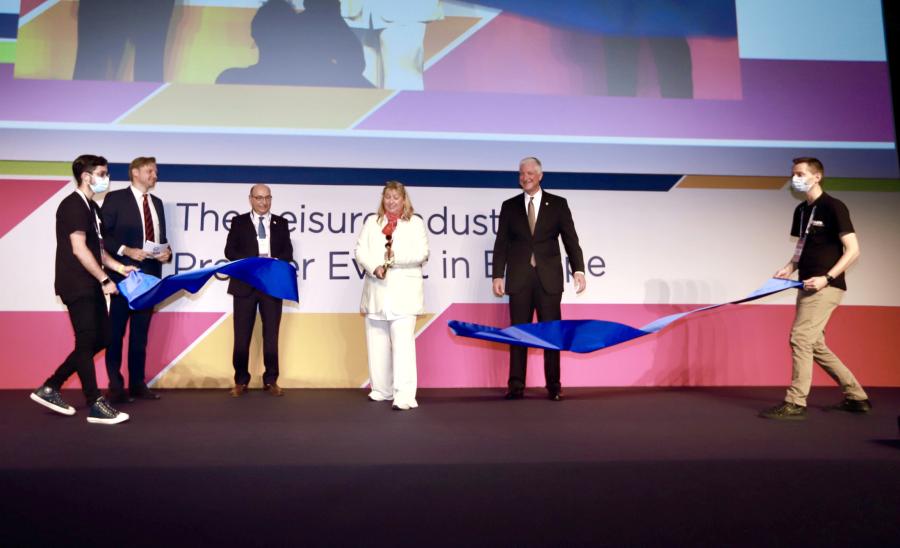IAAPA Expo Europe Opens in Barcelona

BARCELONA, Sept. 28—Looking forward with optimism.
That was the theme of the opening keynote address at IAAPA Expo Europe today in Barcelona.
“The past 18 months have been difficult for us—as suppliers, as members, as a team," said Jakob Wahl, vice president and executive director of IAAPA Europe, Middle East, and Africa.
“This is not an IAAPA Expo Europe: this is a fresh start. This Expo is about preparing for the future, focusing on inspiration, rather than entertaining.”
The opening event featured no dancers, no park characters, and no pyrotechnics that were part of pre-pandemic opening ceremonies at IAAPA Expo Europe. “We’re focused on inspiring rather than entertaining,” Wahl said.
Wearing face coverings, attendees attended the opening event sitting in chairs specifically placed three feet apart from each other. While the setup was different than past IAAPA Expos, the excitement to return to in-person Expos was palatable.
“We’ve looked forward to this for quite some time,” said Hal McEvoy, IAAPA president and CEO. “This is a great step forward for the global attractions industry. We’ve all gone thru so much in the past few years.”
Wahl and McEvoy were joined on stage by Amanda Thompson, OBE, IAAPA chairman, who thanked IAAPA Team Members from around the globe for their resilience during the pandemic. “IAAPA never closed its doors. The staff kept us going. I bow; I am humbled; I am grateful for you all,” Thompson said on stage.
The “Opening Keynote” address was provided by world traveler Doug Lansky, the author of 10 books and host of TV programs on the Travel Channel. Lansky invited attendees to broaden their perspectives while validating the need for global attractions.
“The roller coaster ride is not over yet, but we are on our way for a better future,” he said.
Lansky challenged attendees to use the concept of “over-fixing:” tactics attractions can use when taking a guest complaint and turning the negative situation into an opportunity to create loyal customers for life.
“If you over-fix it (a problem), you create a better experience than the people who had no problem,” Lansky said. An example of “over-fixing” may be giving guests front-of-the-line passes, along with vouchers for free ice cream, and a coupon for free parking that will encourage a future visit. “They were venerable, and you showed you were there for them,” he says of over-fixing.
He also shared that beautiful photos depicting colorful landscaping and wide spaces on websites encourage visitation.
“For a recovery to work, it needs to be lasting,” Lansky said. That includes keeping COVID-19 safety protocols in place after the pandemic passes. He says travelers have come to appreciate social distancing, the ability to book experiences in advance, and will continue to pay more to have a higher quality experience.
One such example is a hotel in Austria that took four rooms and made them dog friendly. When reservations were made, the hotel would “write” an email to the owner’s dog expressing excitement for their up-coming visit. Upon making the change, the hotel’s revenue ballooned 359%, and their Trip Advisor ranking went from No. 62 to No. 1 in their region.
“A lot of people look at it (making adaptations) half empty," Lansky said. "But it’s a new level of sharing."
